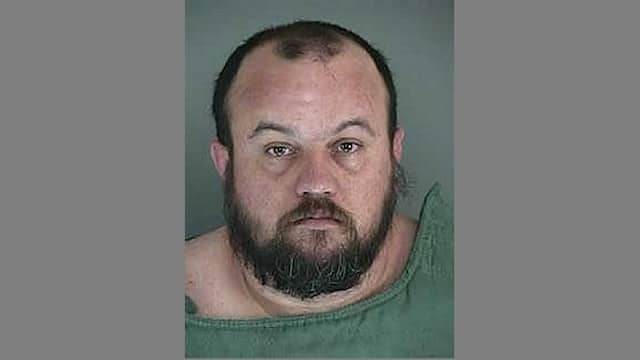By George Jared
William “Billy” Miller told investigators how he ruthlessly ended the life of college student Rebekah Gould, on or about Sept. 20, 2004, near the town of Guion in Izard County. Those words will now be used against him in his upcoming murder trial that is slated to begin Oct. 31.
Circuit Court Judge Tim Weaver ruled Friday (Aug. 26) that the confession, given Nov. 7, 2020, inside the Cottage Grove Police Department in Cottage Grove, Ore., will not be suppressed.
Miller admitted during an hours-long interrogation that hit the college student in the head with a loose piano leg twice, shattering the object as she laid in bed. He then took a necktie from the closet and strangled the woman to death.
He offered no motive for killing a woman he’d reportedly never met, and denied sexually assaulting Gould, whose badly decomposed, partially clad body was found Sept. 27, 2004, off an embankment on Arkansas 9, a rural thoroughfare that connects the nearby towns of Melbourne and Mountain View.
“I played everybody a fool … I strangled her till she didn’t move anymore,” he said. He later added “I am a monster.”
Defense attorneys argued that he was not properly Mirandized in the hours leading up to the multiple confessions, and that it wasn’t voluntary, among other issues. When Oregon State Police polygraph examiner Damian Acosta verbalized Miranda to Miller he failed to tell him that if he couldn’t afford an attorney that one would be provided for him.
Weaver ruled that this was “cured” due to the fact that Miller bragged to officers about being “a king” where he lived in the Philippines and that he made $25,000 per month working on oil rigs. He also offered to pay for a relative’s legal expenses.
Gould’s father, Dr. Larry Gould said he was relieved at the conclusion of the three-day suppression hearing. He said an emotional Acosta apologized for the error after the hearing. He said Acosta played a critical role in obtaining the second confession from Miller, and there was nothing for the officer to apologize for.
Parts of Miller’s confession don’t comport with the known facts in the case, but the essence of what he said is true, Larry Gould said. The father is hopeful that at some point Miller’s true motivations in the death of his daughter will be known.
“I’m overjoyed … hopefully we are headed toward justice for my beautiful daughter, Rebekah,” he said.
Gould, 22, came home that weekend from the Fayetteville area. She stayed with a former love interest, Casey McCullough at his trailer house. McCullough and Miller are first cousins. She reportedly took McCullough to work on the morning of her murder and then returned to his home to pack her clothes and collect her other belongings for a return trip to Northwest Arkansas.
That’s when she vanished.
When police arrived the next day to perform a welfare check, they found a bloody mattress that had been flipped over in the master bedroom, bloody sheets and bedding in the laundry, and blood strewn throughout the house. The woman’s car, cell phone, money, and unharmed small dog and clothes were still in the home.
McCullough told police that he went out with a group of friends after he got off work the day of the murder and didn’t return home that night. When he returned home the next morning to retrieve clothes for work, he said he didn’t notice anything was amiss and went to work.
The case languished for years as police followed leads that led nowhere. Arkansas State Police special agent Mike McNeill was appointed as the lead detective in January, 2020. McNeill said during his testimony from the stand that he decided to treat the case as if it had just happened.
He decided to start his new investigation with McCullough, who was an original person of interest in the case, and several of his family members. After multiple interviews and examining the known evidence, McNeill was convinced someone in the family was involved.
“I felt like the person responsible was a McCullough or someone related to the McCulloughs,” he testified.
One detail in the original case file jumped out to the special agent. The night before the murder, Miller had briefly visited McCullough’s home. He pulled into the driveway and talked outside with McCullough for about 15 minutes. Miller arrived in town that day to help his mother and younger brother move back to Aransas Pass, Texas.
He was interviewed by police in Texas days after she disappeared, but nothing came of it, and his name faded into the recesses of the case file. McNeill said the fact that he’d been in close proximity to Gould just hours before she died intrigued him.
Miller, who owned a plantation in the Philippines and worked on deep sea oil rigs around the world, was visiting family in Oregon in the fall of 2020. McNeill traveled there to interview him.
By this time the case had drawn national attention, and Miller said numerous times during his more than 10-hour interrogation that he kept up with the constant publicity.
Investigative journalist/true crime author George Jared wrote about her case in three separate books. Podcaster Catherine Townsend profiled her case in the first season of “Hell and Gone” in 2018. Former Army counterintelligence agent Jennifer Bucholtz wrote a series of articles for American Military University in 2019, and she profiled Gould’s case on the AMU podcast “Break the Case.” Dr. Mehmet Oz even did an hour-long special on the case in 2018.
Jared and Bucholtz started a Facebook group, the “Unsolved Murder of Rebekah Gould” and one of the first people to join the page was Miller. During the next 10 months he sent numerous private messages to the two, mostly Bucholtz and often commented on posts about the case. The two became suspicious of his comments and forwarded them to McNeill.
A chapter in their recently released book “Silent Silhouette” is devoted to his interactions on the page and behavioral analysis of the case. One thing they learned was that on the day of the murder, Miller’s brother was abruptly pulled from school. Miller and family members then made an unscheduled trip to Branson, Mo., that afternoon, but returned later that night to finish packing for the trip to Texas.
McNeill chatted with Miller for over an hour and then he asked him to take a polygraph exam. A visibly shaken Miller agreed to the test and later failed it. McNeill reentered the interview room with a bold plan. He had the Texas Rangers acquire pictures of the truck Miller owned in 2004, a Chevy S-10. He brought them with him and a picture of a bloody rag collected at the crime scene.
He told Miller the killer’s DNA was on the rag, and that Rebekah’s DNA was found near the gas pedal in his former truck. And, neither of those things was true. Police are allowed to use deception in interrogations by law.
The bold move by McNeill worked.
Miller tried to concoct a story about seeing two men on the back porch of the trailer that morning when he was hunting, but McNeill interrupted him.
“What you are saying is ridiculous … tell me what you did Billy or tell me how you helped Casey cover it up,” McNeill said in emphatic tones. Miller asked to step out of the room to console his mother, and when he returned, he confessed.
Miller said he was out hunting early that morning on property adjacent to the trailer house. He noticed Rebekah’s car and decided to go to the trailer. He hid his truck in a nearby field. He knocked on the door, and she answered. He identified himself as McCullough’s cousin and asked if he could use the phone.
He claims this is the first time they’d ever met. She walked into the bedroom and laid back down in bed with her head facing away from the open door. As he pretended to talk on the phone an urge to kill her overcame him, he said. He began to pace back and forth in the trailer, and suddenly a loose leg on a piano in the living room fell to the ground.
He picked it up, walked into the room and struck Gould twice in the head, shattering the piano leg. He then got the neck tie, and strangled her.
“It was a spur of the moment thing … she didn’t know it was coming,” he said.
Afterwards, he wrapped her body in a sheet and placed her next to the bed. He threw a number of bloody items into the laundry including the bedding, and flipped the mattress. He took Gould’s clothes out of her suitcase. He wanted to move her body with the suitcase but it was too small, he said.
He spent about 15 minutes cleaning the trailer. He bleached spots of blood and tried to remove his DNA from things he touched. Miller said he took Gould’s body and several items, including the suitcase to his truck. He claims that he drove through the entire town of Melbourne with Gould’s body in the back of his truck even though there is a rudimentary gravel road that leads from the vicinity of the McCullough trailer to the spot where she was dumped.
Miller said he drove right past the turnoff for the Izard County Police Department. He dumped her body. He then went to a local car wash where he cleaned the bed of his truck and threw the remains of the piano leg and the sheet she was wrapped in, into the trash.
He told McNeill where he could find the suitcase that he tossed somewhere in rural Izard County. The murder was never far from his mind, Miller said. He had a picture of her gravestone in his phone and the passcode on that phone was 0204.
It’s unclear how he acquired the photo of the headstone. He told investigators that he hadn’t been back to Arkansas since the week of the murder in 2004.
Prosecuting Attorney C. Eric Hance made the closing argument in the suppression hearing for the state. It was noted that Miller had been interviewed once early on in the case, but then wasn’t looked at for more than 16 years.
When he entered the Cottage Grove Police Department, he opted to play a game with investigators, Hance said. The prosecutor compared the interrogation to a game of chess. The fastest checkmate in the game can be achieved in as little as two moves. It’s commonly referred to as a “Fool’s mate,” and the white side loses even though it makes the first move of the game.
Hance noted that Miller made the first move by walking into the police station and could have walked out at any time. Hubris overtook the man who would hours later brag about how he fooled his family, police, and everyone else attached to this case.
“This king has been captured because he played a fool’s game,” he said.






